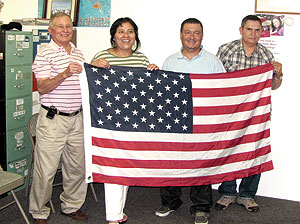Fourth has special meaning for newest citizens
*

These locals are ready to embrace their new status as U.S. citizens (left to right): Jose Francisco Reyes Rodrigues, Alma Mejia, Carlos Lenos and Manuel Baires. – Photo by Elizabeth Sheeran
By Elizabeth Sheeran
Somerville resident Manuel Baires is doing something uniquely patriotic this Fourth of July.
He’s reviewing everything he’s learned about U.S. history and government, and making final preparations to show up the next day to his scheduled appointment with an officer of the United State Citizenship and Immigration Service. If all goes as expected, he will return home a United States citizen.
“As a citizen, I can vote,” said Baires, a machinist, on deciding to take the final step to become a naturalized citizen of the United States. “As a resident, I don’t have the right to say anything. But by becoming a citizen, I can speak up to the government for more health clinics, more schools, more rights.”
Having a voice in the political process is also important to Alma Mejia, who will have her day at the citizenship office on July 30. “For me, the first point is to vote. That’s the most important thing,” said Mejia, who lives in Somerville with her two sons and cleans homes for a living. “It’s to make myself count. To say there is one more person here. If I don’t vote, even if I have citizenship, I don’t count. If I can vote, I can count.”
Baires and Mejia are both from El Salvador. But they are navigating the same naturalization path to American citizenship followed by legal immigrants from all over the world.
Immigrants can apply for citizenship if they have been lawful permanent residents for at least five years (three if they’re married to a U.S. citizen).They must show they are “of good moral character,” have a working knowledge of English and are committed to the values of the U.S. Constitution. And they have to pass a civics test that can include anything from the number of seats in the House of Representatives to which Constitutional amendment gave women the right to vote.
For Baires, Mejia, and dozens more of their fellow aspiring citizens, preparing for their interview and test meant ten weeks of classes at CORES, a Somerville non-profit whose origins go back two decades to when documented human rights abuses in El Salvador led the U.S. Congress to create a legal immigration path for Salvadoran refugees.
CORES director Marcos Garcia said the center now offers all kinds of services to immigrants from Central America and elsewhere, but the citizenship classes taught by student volunteers from Tufts University are among the most important. “This program is preparing them for something big. To become a U.S. citizen. It’s the final step for them,” said Garcia.
He said committing to classes for eight hours a week can be a daunting proposition for people who are already working long hours to make a living, and who may have had little formal education in the past. But those who stick it out show just how determined they are to become full citizens of their adopted country.
“It’s difficult, but not impossible,” said Jose Francisco Reyes Rodrigues, a retired mechanic, speaking in Spanish. As a senior citizen, he was subject to a less stringent level of testing, but he said he still struggled with memorizing all the information he was asked to learn about American civics. In the end, his dedication to the classes helped demonstrate his commitment to the ideals of U.S. citizenship, and he was approved in June on his third trip to the citizenship office. “Me lo dieron, gracias a Dios,” said Reyes: “They gave it to me, thank God.”
Mejia said the test was intimidating at first. “When I started, I didn’t know anything about the history. Nothing. The Constitution. Congress. Amendments…” But now she feels more than ready, and more up-to-speed on civics than her sons who were born here. “Now it’s easy. I know the book. I’m ready to go,” said Mejia.
For Baires, the decision to start the process was the hard part, but once he did, he found the classes interesting. “It was good to study the history of this country, and all the levels of government, because every country is different,” said Baires. He joked that he’s been able to stump his native-born American friends. “They didn’t know who John Boehner was,” he said.
Classmate Carlos Lenos, a local carpenter, said he found it surprising to learn about the different branches of government, and who does what. “I have a lot of friends who were born here who tell me, ‘maybe you know more about the history than me,’” said Lenos.
Like Baires and Mejia, Lenos said he can’t wait to get in front of a citizenship officer to demonstrate what he knows about U.S. history and government. And he’s serious about what it means to be a good citizen.
“I don’t want to miss the opportunity to be a citizen because I feel like an American, and I respect the rules of this country,” said Lenos.
Baires said good citizens know the laws and follow them. Mejia said it’s important to be willing to serve on a jury. Reyes said if he were a younger man, he would serve his new country in the military.
And all of these citizenship class alumni spoke of the right to vote as both a unique privilege and an important obligation of citizenship, and said they looked forward voting in the national election this November.
“I want to participate. I want to decide who’s going to be the next president. One vote makes the difference,” said Lenos.
And what about Independence Day this year? Does it feel any different?
“Now that I have studied the history, I understand the importance,’ said Baires. “I have more happiness in my heart for the Independence of this country.”
















Reader Comments